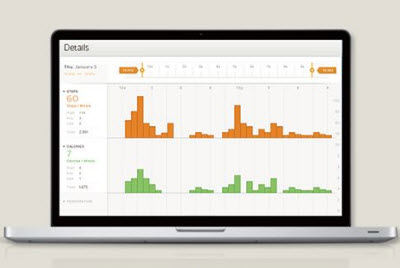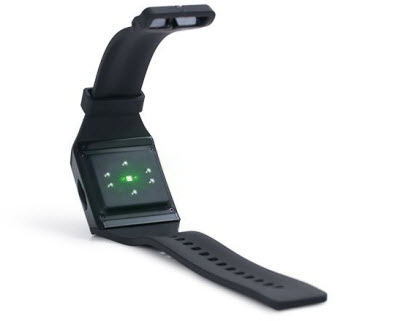Basis Science is announcing today it has raised $11.5 million in a round of funding for its wrist-based health tracker. The company launched the Basis website and health-tracking system in December and has been shipping units feverishly in an attempt to cull its waiting list for the popular devices. The investment is another vote of confidence in the rapidly expanding field of digital health.
 The Basis wrist band functions as a watch, but it also lets you keep a watch on your health habits. The device has built-in sensors that let you monitor your heart rate, the steps you take, how much you sweat, and how many calories you’re burning as a result of your physical activity. Priced at $200, it sits at the high end of devices that are part of the “quantified self” movement, which advocates self-knowledge through measurement of the minute details of your life.
The Basis wrist band functions as a watch, but it also lets you keep a watch on your health habits. The device has built-in sensors that let you monitor your heart rate, the steps you take, how much you sweat, and how many calories you’re burning as a result of your physical activity. Priced at $200, it sits at the high end of devices that are part of the “quantified self” movement, which advocates self-knowledge through measurement of the minute details of your life.
Basis has attracted a lot of attention, and the announcements today will bring it more. The company is adding Deepak Chopra, a healthy living advocate who has written 65 self-help books, and Esther Dyson, an investor and longtime technology analyst. The round was led by Mayfield Fund, with investment from existing investors DCM and Norwest Venture Partners. Tim Chang, a managing director at Mayfield, will rejoin the board of Basis. Chang helped Basis from its infancy and invested while he was previously working at Norwest.
Basis chief executive Jef Holove said in an interview with VentureBeat it will use the money to help meet production demands and scale the business. While other companies are making step counters, Basis Science has always been focused on helping people form lasting healthy habits, he said.
I’ve used the watch, and it can tell me at a glance my heart rate at any moment. It tells the time, how many steps I’ve walked during the day, and how many calories I’ve burned. I’ve also found it very useful at measuring my sleep, or lack of it, telling me something about my habits that I never tracked. I can charge it via universal serial bus while I’m wearing it at my computer, and the data automatically uploads to the web.
On the web, I can see my fitness data over time, including the number of minutes I slept during the night and whether I was interrupted or not.
“Most people in the Valley are sleep-deprived,” Chang said in an interview with GamesBeat. “Measuring sleep is turning out to be important.”
On the web, the data is “gamified” in its presentation, so that I can strive to beat my own records and unlock health goals as I make progress. Holove said he noticed his wife pacing back and forth late at night just so she could hit her daily average for steps. That kind of internal motivation means that the device is doing its job.
“We have an approach to how you make health part of every day,” Holove said. “It’s not fitness exclusively, or a device just for runners. It’s a 24/7 holistic health tracker.”
The watch itself is differentiated because it has a heart-rate monitor, which is also good for detecting whether you are asleep or not. It uses an optical blood-flow sensor that shines a light into the wearers skin and detects the amount of blood flowing. From that, it can deduce the heart rate. That information is something that the other step counters don’t have.
For now, that’s an advantage. But Apple is rumored to be working on its own iWatch, and Basis is going to need all of the investment and resources it can get in order to stay a step ahead of the giant, which has become like the category-killing Walmart of technology.
Regarding Basis, Chang said in an interview with VentureBeat, “They are the company to beat in this space as the market is flooded with pretty pedometers and no differentiation. Apple could come in and crush the pedometer companies. If all you have is a pedometer, you’re going to get squished.”
Chopra is a heavy hitter when it comes to drawing attention. He has written numerous New York Times bestsellers, and he advocates a holistic approach to health. He is trained as a doctor of internal medicine and endocrinology and is a fellow of the American College of Physicians.
“People can now get a more complete picture of their overall health, with visibility into their activity and sleep, as well as important physiological metrics like heart rate,” said Chopra said in a statement. “This means Basis can offer a more engaging and insightful way for people to get and stay healthy.”
Dyson is known as a Silicon Valley insider (she was actually a guest on Bravo’s ill-fated Startup: Silicon Valley reality TV show). She is an angel investor, entrepreneur, and frequent commentator on health care and health technology. She was also an early proponent of quantified self.
Other advisors include Kevin Colleran (one of the first 10 employees at Facebook), Kai and Charles Huang (creators of Guitar Hero), Patrick McGill (media and entertainment industry veteran), Daniel Kraft of Singularity University, and Jeff Rosenthal along with his co-founders of entrepreneur organization Summit Series.
To date, Basis has raised $20.5 million in revenues. The company hasn’t reported its sales so far, but Holove said that it is working on bringing down its waiting list, which is in the “five figures.” Over time, Basis is going to collect a lot of big data about our bodies.
“The first few weeks of data is encouraging,” Holove said. “People are adopting healthy habits.”
VentureBeat's mission is to be a digital town square for technical decision-makers to gain knowledge about transformative enterprise technology and transact. Learn More


